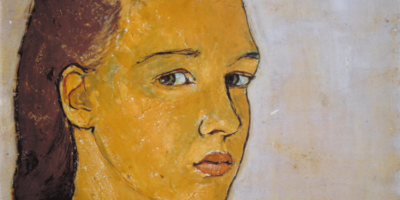
How to Hide: Instructions from a Daughter of Survivors
 Shlep that suitcase tied with a rope long after the rope breaks. Clutch an old brass lamp you once bought at a corner antiques store. Polish it up. Go on, buy a bulb. In your next home, conjure plenty with the scarves you drape over sticks of furniture. People will remark on your “resourcefulness.” How long will you be staying this time? A connoisseur of string and packing tape, you recite street names like a litany.
Shlep that suitcase tied with a rope long after the rope breaks. Clutch an old brass lamp you once bought at a corner antiques store. Polish it up. Go on, buy a bulb. In your next home, conjure plenty with the scarves you drape over sticks of furniture. People will remark on your “resourcefulness.” How long will you be staying this time? A connoisseur of string and packing tape, you recite street names like a litany.
When the landlord shows an apartment, pretend to inspect for closet space, cockroaches, and fire hazards. Count the electrical outlets. In truth, you are looking for back staircases, trap doors to attics, closets that open into hidden rooms. Do this also at parties when everyone has forgotten you: standing against the wall, a mild expression on your face, hands behind your back. Creep around looking for basement entrances, spare rooms, back doors. If anyone asks, say you’re interested in architecture. The astute individual who notes your communings with walls and thresholds, someone’s father, will praise your gift for relating to space.
Transfer colleges at least once, preferably mid-semester. telling no one, departing under cover of darkness, leaving behind your unpaid bills and no forwarding address.
Wear dark, dreary, nondescript clothing that hides your figure. Slouch if you are tall. Drape yourself around chairs. Hesitate to stand. Let your hair fall across your face. Walk the edges of corridors, taking small, quick, wavering steps.
If you are short, stand next to pillars of basketball players— you’ll appear to disappear. Wear faded t-shirts with pictures of animals and your hair in braids. Ask other people to reach objects on high shelves. You want to find out who is willing to help. Keep a low profile and an unpublished phone number. Practice getting lost in crowds.
This is essential: have several places to hide.
Ingratiate yourself to a few powerful individuals in your social network who have a sensitivity to anti-Semitism. Tell these people the truth. One or both of your parents hid from the Nazis and is alive today partly because of the good will of others. Kept in attics or basements. Passed off as visiting relatives. Perhaps they assumed a false identity and traveled with false papers. They were lucky. Someone sponsored their immigration. Say this confidentially, out of context, spontaneously, in a rush of emotion often followed by flushed skin, tears, the jitters.
Watch as that person experiences a renewed sense of your vulnerability and worth in the world. Avoid feelings of martyrdom and heroism. Think ahead: it could happen again.
In general, when asked your religion, say, “I wasn’t really raised to be anything.” If pressed, drop your eyes and say, “Jewish.”
Or, after a long acquaintance, inadvertently mention you are Jewish. As if it’s a shoe size. Be pleased when the person exclaims, “I didn’t know! You certainly don’t look Jewish.” Sigh with relief. You can pass. If you have blond hair or blue eyes, or both, feel especially lucky.
When you have a house of your own, maintain at least one room—neat and furnished—as a spare room. You never know. You believe in kindness; you practice quid pro quo. Shelter should not go unused in your single, childless life.
People who will want to use the spare room for varying lengths of time include: friends adrift in their lives or in flight from live-in lovers, the teenage sister of a Catholic college friend waiting out her pregnancy far from her small-town home, commuting academics, a friend who comes into the city for monthly chemotherapy. And parents, who will visit often.
Encourage your visitors to bring memorabilia, leave clothing, and use the phone. Make them feel at home.
Keep your passport intact. Collect shoulder bags, leather bags, beach bags, lunch bags, overnight bags.
Maintain more than one permanent residence, preferably in two different countries. Keep busy buying two of everything, shipping boxes, and interior decorating: creating secure, beautiful homes for a complicated you requires stamina and devotion. Cultivate a slight, hard-to-place accent. Constantly refer to the locale where you are not. Boast about friends around the globe, but keep a certain aloofness.
If you hold an office job, nod sympathetically when friends arrive panic-stricken at your cubicle and say they are “hiding” from the boss. Talk about yourself reluctantly, if at all, and always be willing to listen. Be considered “private.” But loyal.
Here are some obvious professions to consider: Teaching English as a second language (a new generation of refugees), adoption agencies (remember the children’s transports), victims’ rights groups (your empathy and organizational skills). Real estate is an option, but one that may not satisfy your social conscience.
Statistically, you should not be here. Mistrust statistics. Believe in the exception to the rule.
Avoid controversies. Be neutral. Be the advisor instead of the star. Above all, avoid conspicuous living and arousing the envy of peers.
Or, rise in an organization where no one would ever expect to find you: for example, the Y.M.C.A. when you are neither young, male, nor Christian.
Best to defer career decisions in favor of the dilettante’s expertise, for with multiple training and transferable skills you will always be useful somewhere to someone.
Train yourself in outdoor survival: winter camping, recognition of edible and poisonous plants, long-distance swimming.
Experiment with giving a false name when making reservations or when meeting strangers in bars, airplanes, supermarkets. Make a game out of these opportunities to practice answering to a name other than your own, and choose names your parents would never have considered: Heather, Vanessa, Bobbie Ann. Tell friends who witness this behavior that it’s the repressed actress in you.
Be drawn to men who suffered early, inetrievable losses such as physical/ sexual abuse or the death of a parent. Have a deeply enduring sympathy for these lovers. Nevertheless, expect pain. Play victim to a man’s victimizer—given your guilt, you’d rather be hurt than hurt. Hide in a marriage to a man with an important career and serve him, his work, his name. Expect your children’s lives to become your own.
Live with a quiet, unrelenting and nameless fear in the midst of good fortune and ease. A whispering secret that won’t leave you alone, and one that arrives like an intruder when you are alone. You are mostly alone. Your life is like a thin strip of light under the door: surrounded by blackness and in danger of being shut off. And you aren’t even the one who was in the war.
Hide from yourself. Who are you anyway? Isn’t every breath of your existence taken at the expense of six million? That readiness to step into the crevices others leave. An unwillingness to impose. Your famous reticence. Without even having been told, you act as if the penalty for a real self is to be shot down, turned in, taken away.
Remember: a nice person is the American translation of a good German. Learn to distinguish between a nice person and everyone else. See ferry boat operators who squeeze you aboard as the ship is leaving shore or strangers who return your lost wallet in the mail as necessary and convincing signs that spontaneous acts of generosity do continue.
Test the world. The well-meaning neighbor, the kind employer, the munificent lender, the tender friend and the honorable lover—goodness exists in fissures you fall through.
Test the world, but if you’re lucky, shed your unwieldy cocoon. You might begin inhaling the scent of new luggage. Try flicking on a sturdy floor lamp. Go on, roll out the rug. Fasten a silver mezuzah on the door frame. Breathe deeply. No one’s coming up the stairs. Listen to what’s written on your heart. What you’ 11 repeat.
You are here.
Karen Propp is a writer who lives in Cambridge, Massachusetts. She has published widely and teaches at Boston College.
Nechama Liss-Levinsons: When a Psychonalyst Teaches the Holocaust
Nechama Liss-Levinson, 42, is a psychoanalyst and writer. Her forthcoming book is When A Grandparent Dies: A Parent/Child Workbook for Shiva and the Year Beyond [Jewish Lights Press]. Here is how Liss-Levinson would teach Karen Propp’s “How to Hide”:
I might use this beautifully written story as a tool when working with people who struggle with trauma. Propp describes a specific trauma here: that is, not that of actually having experienced the awful event, but that of “psychically witnessing” someone else’s trauma. In this story, the woman is profoundly affected, developing her own unique form of Post-Traumatic Stress Disorder.
This story is only one person’s “instruction manual,” one person’s way to be a child of survivors. I might tell someone: “There are many different instruction manuals to be written, many existential lessons to be drawn. Can you use Propp’s story to open a door, to help you understand the power of your own narrative?”
Propp’s tone is staccato and pressured, so intimate, like she pulls us into a dark alley and whispers, “Here’s the deal!”—and then tells us something slightly crazy, yet scrupulously thought out.
Why this urgency and secrecy? This sense of testing oneself constantly? For a person who hos experienced trauma, this story might feel like a good support group: feeling intimate kinship with the speaker, but not having to respond back.
“How to Hide”shows the extraordinary development of what’s called a “false self.” It’s dangerous to let one’s “real self” show: it literally invites annihilation. There’s this frightening split (who you really are vs. who the world thinks you are). One must flee one’s identity, constantly refabricate it. The woman in this story has lost touch with her original goal—to run until she’s safe. Instead, running becomes her life, staying alive at all costs.
We feel our own need to hope, in reading this story. For our own mental health, we need the subject to care about doing acts of kindness, to trust, to want to return goodness to those who enabled her parents to survive. How might I “teach” hope? By encouraging the “false self” to recede, by helping a traumatized person to find an end to the running; by encouraging a “witness” to remember, even in the depths of pain, there ore sparks of humanity.


